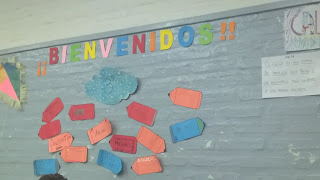After spending four months at school Nº 246 (starting observations in June) in 4th and 3rd grade, We've finally finished our expierence as teacher trainees. Some time ago, I was reflecting on my first day at school as a mere observer but now, it's time for me to think on the opportunity I had, to spend time, share and value the children while teaching English at school. One of the best moments in LIFE is when a kid in your class calls you "teacher", you can feel the quickening of your heart under the pinafore; Such is the big impact it causes on you....- this is it: You are someone else's teacher, you should own it, and be respectful to those who are expecting something from you, wisdom, resourcefulness, patience and above all, love and care. This is the hardest part, you're like a superheroin, you should behave accordingly because little children are observing you and you are now, their role model. Class after class, you learne their names, you learn what do they like, what they do not like, what is it that they find interesting, funny or boring; You learn about them and that's mainly why, it's INEVITABLE to learn to care about them... At this point I think that building rapport is the "natural" thing to do.
I'm quite familiar with this tendency to recover mostly good times as time goes by, but so as to be fair and looking back under a critical eye ( at myself, of course), I will mention some aspects that may have been troublesome:
*Disrupting behaviour
*the usage of ICT's
*LACKING TIME
As regards the first point, after thoroughly thinking it, I don't believe there's a perfect class and no magic recipes for teaching. Children are just children, they love to play, the laugh, they have a constant need to be moving around and yes, they need to play. That is simply fine. During the lessons we've taught, big efforts were made so as to keep a balance between games and the 'traditional' way of learning. When planning, this combination and the idea of 'learning by doing or playing' was always in our heads, inasmuch as it was considered a main key to succeed. In fact, our mission was to teach English in a way that it was perceived as ENJOYABLE. For some kids, learning a new language results more interesting than to others; There are some who show a certain degree of "resistance" towards EL. The latter, must have their reasons for that, surely: CULTURAL BAGAGE plays an important role in this aspect, and as far as I am concerned, hearing some comments like: "Acá estamos en Argentina, asique hablá en Español" or "¡Para qué quiero saber Inglés yo? reinforces this idea. The fear to somehow "betray" or harm in someway our own identities (in this case as part of a nation where Spanish is the official language) represents a barrier, limits us during the learning process of a foreign language. Moreover, I could find a straight connection between the above mentioned issue and disrupting behaviour: There is no such coincidence in that the kids who were less envolved, were also the ones who were more opposed to the learning of a foreign language. Hence, I would say that a possible solution has to be related with the application of the INTERCULTURAL APPROACH; There is no way, in my oppinion, that children learn English without learning as well about English Culture. And, at the same time, students should learn about their own culture to equally value it and in such way they will not feel their own identity is being threatened.
ICT, The usage of technology had undoubtedly generated an impact on teaching YLE. Firstly, I think it's important to mention that for some children, to interact with technology may be a whole novelty: As in the pajority of peripheral schools many children attending there, are those with low resources. So employing ICT in our lessons constitutes an effort to reduce the distances between children who have access to technology and those who don't. Sometimes, and very often it happens that technology trick us, teachers. It happened to us whrn trying to show a video. Fortunately, we were able to solve it. Two main aspects are due in the happy resolution of these inconveniences: *Team work and *Planning -> resourcefulness. On one hand, working as a team is fundamental. I particualarly got the chance to work with a friend to whom I know very well and viceversa, so a few words and only a look were necessary for the understandment with each other. If something went wrong, certainly we'd solved it together. On the other hand, planning beforehand gives you the chance to prepare yourself and to be ready to improvise given adversity. Here, our role as a resource can be challenged.
Finally, as a very important problematic fact stands LACK OF TIME. This is an issue whos impact has effects on planning and during the lesson development. In first place, we'd come across with lacking time, daily . Planning lessons takes quite a long time, since you need to find appropiate activities for your students and taking into consideration potential drives, that a class may have. Also, frustration would emerge from what you expected a class to be, entertained and smoothly flowed. So, timing though sometimes can be regarded as less important, it's in fact crucial when planning.
For me, the time we spent in school was enourmously valued and something that I would never forget. I will treasure this expierence for the rest of my life.









